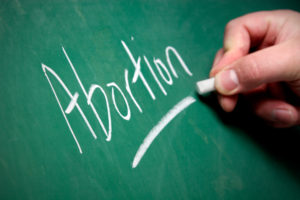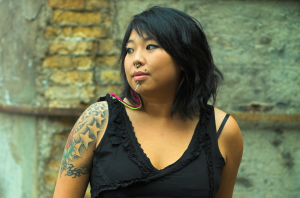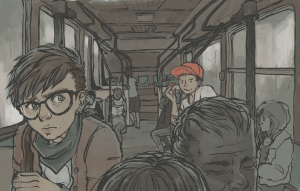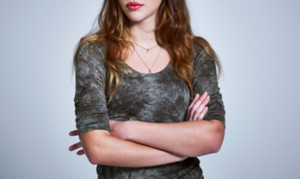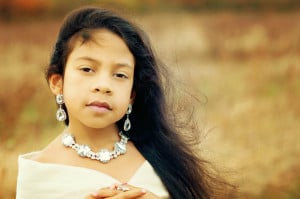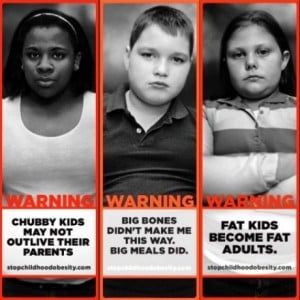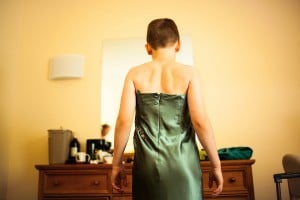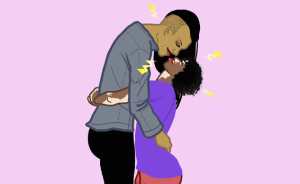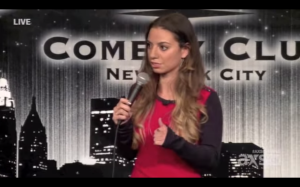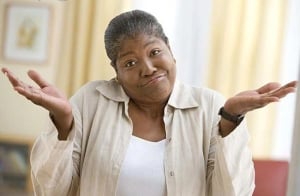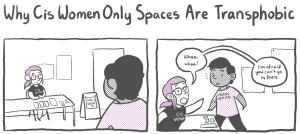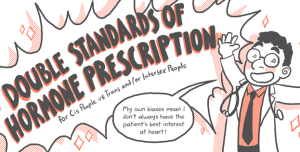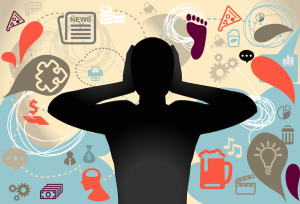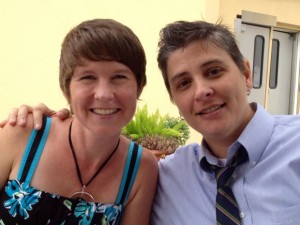
Source: xoJane
Originally published on xoJane and republished here with their permission.
I came out before Ellen did, long before Katy Perry sang about kissing a girl (and liking it).
I was a sophomore at a big state university, when I discovered — much to my surprise — that I’d fallen madly in love with my best friend.
In the mid-90s, it certainly wasn’t mainstream to be gay. I was the first gay person most of my friends had ever met. But I was thrilled to be gay. I had obsessed over the idea that my complete disinterest in guys meant there was something really wrong with me. I was elated to find out that there was nothing wrong — I was just gay.
My parents, on the other hand, weren’t as thrilled. They spent years praying it was just a phase (spoiler: it wasn’t). They wanted grandkids and for me to have a normal life. Finding a man who would love me and care for me was one of their primary goals.
When I turned my back on what they saw as a traditional life, they believed I was sentencing myself to a life devoid of happiness, that I’d find this “lifestyle” lacking the fulfillment that a heterosexual marriage could offer me.
While they were fretting away about my future, I was having a gay old time in college. My girlfriend and I eventually stumbled into the cultural phenomenon that is the gay bar scene. It was kitschy and fun. It was boozy, rowdy, sexy… and there were drag queens! We’d found our people. We had a blast. We were happy. We loved each other. We excelled in school. We knew we had a future. We weren’t worried at all.
And then we split up.
The loss of that first all-consuming love is heartbreaking. And boy, did I embrace being heartbroken.
I ramped up my booze intake. I went back to those gay bars, looking for a connection, looking to lose myself in the moment. I found those things sometimes. Sometimes I made a complete fool of myself (heartbreak and booze are a dicey combo). But when I was in a gay bar, or surrounded by my lesbian friends at a party, or cheering at the Atlanta Pride Parade, I knew I was surrounded by people who understood a part of me that the world wanted me to banish or, at the very least, hide.
Despite the rollercoaster of ups and downs in my personal and romantic life, I remained an out and proud lesbian. It was my identity, and I embraced it whole-heartedly.
Fast forward to my late twenties. In a lesbian bar, surrounded by women doing Jell-O shots late on a Sunday afternoon, I bumped into Amy. I’d met her before, briefly. I’d made my move at our first meeting, but she had a girlfriend. I didn’t see why that should be an obstacle; fortunately, her loyal nature outweighed my questionable morality.
But this time, she was newly single, and I was new in town. Our meeting was as unexpected as two lesbians running into each other at a lesbian bar can be. But it seemed like the perfect reconnection for us — over Jell-O shots in the midst of our tribe.
Amy and I were right together in a way that was hard to deny. We’d both been struggling when we met, her with losing her brother the previous year, me with depression — although I couldn’t have identified it at that point.
Our personalities complemented each other. We laughed a lot together; we looked out for each other. She understood me in many ways better than I understood myself. When she looked at me, I was completely undone.
So, we did what any other lesbian couple would do: We moved in together. Then we got married. Well, not legally. This was 2006, and same-sex marriage wouldn’t be legal in Florida for another nine years. But, not to be held back by a minor point like legality, we had an outdoor ceremony with all our friends. We said vows. We promised to love each other. Then we partied.
Amy and I loved being married to each other. Marriage intensified our already strong bond; it gave us a firm foundation, an anchor when life got turbulent.
And life did get turbulent.
We both were still partying pretty hard. There were close calls with infidelity, drunken arguments, and wounded egos. There were random people we let come in and out of our lives, a few of which we let crash at our house. But mostly there were two people who loved each other very much but hated themselves. We were self-destructing, and alcohol was the catalyst.
So, in October 2008, we both got sober.
Getting sober is not for the faint of heart. Recovery involves unearthing all the things that made you want to drink in the first place, and then addressing them. It is hard, emotional work.
And, in many ways, the process of getting sober has to be navigated solo. But we leaned on each other for encouragement. We rehashed the meetings, joked about the weak coffee, and both started to heal from the physical and emotional ravages of alcohol. We started to grow up, to take responsibility for ourselves, our actions and our family of two.
That was another problem: We were desperately trying to add a plus one to our family of two. Ultimately, we battled two years of infertility and dealt with a crushing miscarriage before we conceived our daughter. But through the difficulties, we leaned in to each other and counted on the lessons we’d learned in recovery to guide us through.
On January 28, 2011, our sweet little girl made her way into the world with her fist raised high in triumph, the ultimate expression of her big personality and her joyful interaction with the world at large.
Now, we had everything that my parents had desperately feared I would miss out on: a home, a marriage, a child. I was completely enamored with my life. Being gay was still central to my identity.
In fact, coming out was one of the first moves I made in any conversation. I’d mention my partner (code for “Hey! I am gay!!”) or I’d throw in a casual reference to my daughter’s other mom. Being out was my way of proudly proclaiming that gay people are worthy of marriage and parenthood — that we live and love the same way that everyone else does. If I listed the most important things about myself, being gay was always in the top three. It was simply central to who I was.
It wasn’t just that I identified as gay. I embraced being gay. I loved it. Being gay took me out of the realm of being entirely privileged — it made me empathetic, opened my eyes to all the privilege I still held, and it made me want to fight for the underdog. Hell, it made me realize there was an underdog. I am better, more compassionate, more willing to fight for change because I am gay.
Imagine the seismic shift in my identity then when Amy sat down one night after a therapy session and told me that she was transgender.
To be fair, this wasn’t a complete shock to me. She had struggled for years being uncomfortable in her own skin. She constantly got called “sir” in public, which didn’t faze her at all. What bothered her was when people corrected themselves, when they broke the illusion. She much preferred people read her as male.
I knew all this, but I had hoped there was some sort of work-around for her gender dysphoria. After all, I am a lesbian. I’m attracted to other women. Women. Not men. But the truth was simple and plain: Amy, in her heart, her mind, her psyche, was male.
No amount of pretending, avoiding or denying (mostly in an effort on her part to save our relationship) was going to change that. Instead, for her efforts, she was spiraling deeper and deeper into depression. And I was living with a shadow of the person I loved.
It turns out that I was the only one here with a decision to make. For Amy, living out the truth had become a life or death matter. I could stay or I could go. But, either way, Amy had begun to transition.
Simon is his name.
What does an almost forty-year-old, out and proud lesbian do when her partner comes out as a transgender male? I don’t really know. I can only tell you what this lesbian chose to do: I chose to stay. I chose to stay because, when I really got honest, if Simon was a boy, he’d always been a boy, whether I’d acknowledged it or not.
I chose to stay because Simon is brave, kind, honest and loving ways in ways that Amy could never quite muster up the openness, the transparency, to be. I chose to stay to honor the family that we created together. I chose to stay because I can’t imagine my life without him.
When I begin to overanalyze what staying with Simon means for my lesbian identity, I get a little panicked. Losing the lesbian label feels a bit like losing part of myself.
But then I look at the person I committed my life to almost ten years ago, I look at our child who adores us both, and I know that with Simon is where I want, where I need, to be. I love him. And he still gets me like no one else does. These things transcend labels.
I am a lesbian who woke up one day married to a man — and I couldn’t be happier or more proud of him or of us.
Just don’t assume I’m straight.
[do_widget id=’text-101′]
Search our 3000+ articles!
Read our articles about:
Our online racial justice training
Used by hundreds of universities, non-profits, and businesses.
Click to learn more





